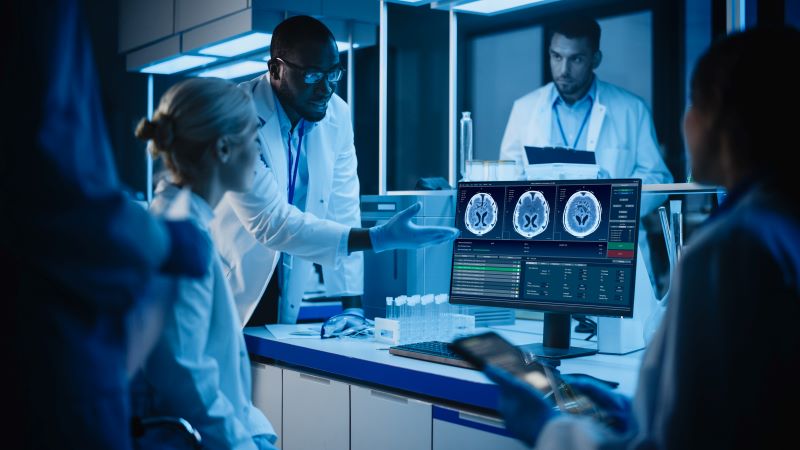What Does Stroke Center Certification Mean?
April 16, 2025
Every 40 seconds, someone in the U.S. has a stroke. It could happen on your street, in your workplace, at a store where you shop — anywhere.
A stroke occurs when a clot blocks a blood vessel that carries oxygen and nutrients to the brain or when the vessel bursts. When this happens, part of the brain does not get the blood and oxygen it needs. This leads to the death of brain cells in that area.
Watch What is Stroke?
Stroke is the No. 5 cause of death and a leading cause of disability in the U.S.
Timely stroke detection and treatment are key to improving survival, minimizing disability, and accelerating recovery times. In fact, rapid access to medical treatment makes the difference between full recovery and permanent disability.
Stroke center certification represents our commitment to you.
Trinity Health Michigan hospitals have gone the extra mile to achieve advanced certifications for stroke care. Certified stroke centers have the necessary structure, staff, and procedures to ensure rapid identification and treatment of strokes. You can feel sure that you are getting care at a place known for its skill in treating strokes.
Thrombectomy-Capable Stroke Center (TSC) certified hospitals offer endovascular thrombectomy procedures. This is a minimally invasive way to remove blood clots. These clots block brain arteries during a stroke. The centers also provide care for patients after the procedure.
o Trinity Health Ann Arbor
o Trinity Health Oakland
Comprehensive Stroke Center (CSC) certification is the most demanding and designed for hospitals that can treat patients with complex strokes.
o Trinity Health Grand Rapids
Primary Stroke Center (PSC) certified hospitals provide the critical elements to achieve long-term successful results for stroke patients.
o Chelsea Hospital
o Trinity Health Grand Haven
o Trinity Health Livonia
o Trinity Health Muskegon
Acute Stroke Ready Hospital (ASRH) certification is for hospitals or emergency centers with a dedicated stroke-focused program.
o Trinity Health Shelby
Certification helps us follow set guidelines and best practices for stroke care. This leads to better and more consistent treatment. It also reduces the risk of complications and death.
What else do I need to know about stroke?
Time is critical in stroke treatment. Know the signs of stroke and what to do if you notice them. Your ability to recognize stroke warning signs and call 911 can save a life. It can also affect recovery and long-term disability.
Use B.E. F.A.S.T. to remember the symptoms of stroke:
• B: Balance: Sudden loss of balance or coordination
• E: Eyes: Blurred vision, double vision, or loss of vision in one eye
• F: Face: Drooping on one side of the face, difficulty smiling, or trouble speaking
• A: Arm: Weakness or numbness in one arm
• S: Speech: Slurred speech, difficulty understanding words, or inability to speak
• T: Time: It is crucial to act quickly if you notice these symptoms, as they may indicate a stroke.
Call 911 and seek emergency medical attention immediately.
Trinity Health Stroke Centers work with local EMS. This helps them get you here quickly. They can start treatment on the way. They also give us important information so we are ready when you arrive.
Watch Time is Important
Are you at risk for stroke?
Learn if you’re at a higher risk for a stoke with our quick Health Risk Assessment. Gain personalized insights on how to reduce the likelihood of stroke.




